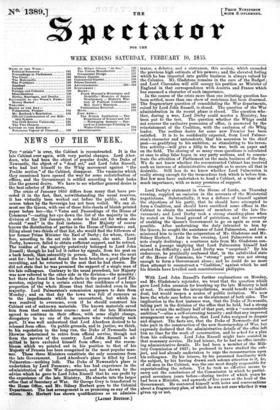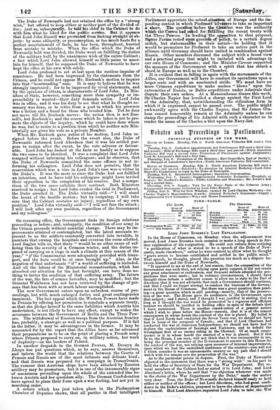With Lord John Russell's further explanations on Monday, and Mr.
Gladstone's rejoinder, we trust that the question which gave Lord John occasion for breaking up the late Ministry is laid at rest. To continue the interpellations, would benefit no indivi- dual, but would reopen a source of public irritation. We now have the whole case before us on the statement of both sides. The implication in the first instance was, that the Duke of Newcastle, taking part in the division of the office that he held, had a strong wish to retain the military half of that post, with a "commendable ambition "—alias a self-overrating tenacity ; and that any improved arrangement was so hopeless, that Lord John resigned in despair and disgust. The facts are, that the Duke of Newcastle did not take part in the construction of the new Secretaryship of War, but expressly declared that the administrative details of the office left him no time for the work of construction, and he asked for a plan from his colleagues. Lord John Russell might have assisted in that necessary service. He had leisure, for he had no office involv- ing administrative details. He had been a member of the Mili- tary Commission of 1837; he professed to have studied the sub- ject, and had already undertaken to urge the reconstruction upon his colleagues. By his leisure, by his presumed familiarity with the subject, by his having drawn such solemn attention to it, he, of all men in the Cabinet, was the one most deeply responsible for superintending the reform. Yet he took no effective means to carry out the conclusions of the Commission in which he partici- pated seventeen years before—during twelve of which years he had been a Minister, and upwards of five years at the head of the Government He contented himself with notes and conversations about a fragmentary plan, of which he was; not sure whether It was given up or not,
The Duke of Newcastle had not retained the office by a "strong wish," but offered to keel) either or neither art of the divided of- fice; just as, subsequently, he told Ns chid In the Cabinet to do with him what he liked for the public service. Bat it appears that Lord John Russell was prevented from looking straight at ob-
jects: by some obliquity, or preconception, or too much -baste for-a
perfect ascertainment of facts, he has been, throughout, hurried from mistake to mistake. When the office which the Duke of Newcastle held was divided, the Duke went on fulfilling the duties of the military half, by the unanimous wish of the entire Cabinet ; a fact which Lord John allowed himself so little pains to ascer- tain for himself, that he supposed the Duke of Newcastle to have kept the office at his own wish solely.
Lord John professed to act at last upon the restless impulse of conscience. He had been impressed by the statements from the Crimea, and he could not oppose Mr. Roebuok's motion to inquire into that "heartrending" case. It is easy to believe that he was strongly impressed ; for to be impressed by vivid statements, and by the opinions of others, is characteristic of Lord John. In Min- isters of State, however, something • more than sympathy or im- pressibility is wanted—their duty demands action. Lord John was in office, and it was his duty to see that what he thought ne- cessary was done, or to retire from a post in which his presence was a fiction and a fraud for those who trusted him. Yet he does not move till Mr. Roebuck moves : the action then is not Rus- sell's, but Roebuck's; and the course which he takes is not to pro- mote the objects of the inquiry, which he could have done where he was, but to retire to a position from which he neither acts Min- isterially nor gives his vote as a private Member.
When Mr. Roebuck gave notice of his motion, Lord John re- signed before the event. Before the event also, the Duke of Newcastle informed Lord Aberdeen that it was his settled pur- pose to resign after the event, be the vote adverse or favour- able. Lord John has looked at the facts so hastily as to suppose the two cases to be identical. It was a complaint that Lord John resigned without informing his colleagues ; and he observes, that the Duke of Newcastle committed the same offence in not in- forming his colleagues. Lord John does not perceive, that the reservation which was a vice in Lord John's case was a virtue in the Duke's. It was the more so since the Duke had not fnlnlled an intention, and to have told his colleagues might have invited their opposition to the completion of his resolve. But a oompa- risen of the two cases exhibits their contrast. Both Ministers resolved to resign ; but Lord John evaded the trial in Parliament, the Duke awaited it. The Duke virtually said—" I will stand the brunt of the hostile motion ; but by resigning, I will take care that the Cabinet sustains no injury, regardless of my own position." Lord John virtually said—" I will not face the attack ; I will look after my own position, regardless of the Government and my colleagues."



































